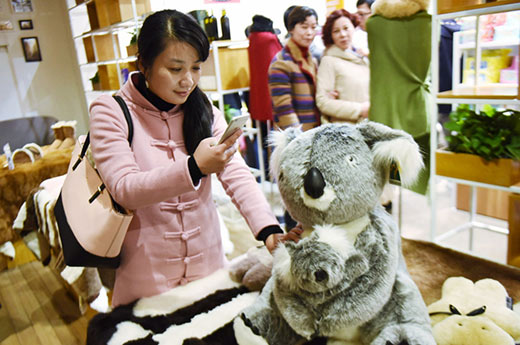当前位置: Language Tips> 双语新闻
Women driving growth of online-to-offline business in China

Females have become the driving force behind China's booming online-to-offline shopping sector, despite their minority position in the country's overall Internet-using population.
女性群体成为中国“线上到线下”(online-to-offline,简称O2O)购物业日益繁荣的推动力,尽管女性只占中国网民总量的少数。
According to a new report from group-buying e-commerce website Baidu Nuomi, women now account for 46 percent of the country's Internet users, but they generate 62 percent of O2O revenues.
根据团购电商网站百度糯米发布的报告,女性用户现占中国网民总量的46%,却为中国O2O产业贡献了62%的收入。
Baidu Nuomi claims it now accounts for a fifth of daily O2O sales-a rapidly growing market that enables online customers to pay online for bricks-and-mortar services, such as movie tickets and restaurant bookings.
百度糯米宣布本网站占日常O2O销售份额的五分之一。O2O市场现正迅速发展壮大,通过O2O模式,消费者可在线上订购传统的实体服务,例如购买电影票和预订餐厅座位。
Tang Lihua, a director at Baidu Nuomi, said the results show that attracting, then retaining, female shoppers has become critical for any O2O platform.
百度糯米总监汤利华表示,从统计结果可以看出,吸引并留住女性消费者对O2O平台的发展至关重要。
"We plan to provide more baby-related and beauty-related services and products, for instance, in order to further grow our business, as we think that's likely to be strong selling-point for women," she said.
汤利华说:“为了促进企业发展,我们计划提供更多的育婴、美容产品和服务,因为我们认为这对女性群体来说是一个重要卖点。”
The study showed that since the start of 2015, female O2O spending has far-outstripped that by males, and the gap is growing, particularly during the country's flagship shopping events such as Qixi, Chinese Valentines Day.
研究结果还显示,自2015年起,女性的O2O消费额已大大超过男性,并且差距还在进一步扩大。这得益于中国几大购物节的刺激作用,例如七夕节,也就是中国情人节的促销活动。
As well as the beauty-related sector, women outspent men in other lucrative areas, too, including gyms and leisure, and hotels, said the report.
报告还称,除了美容消费外,女性在其他营利领域的消费也超过了男性,包括健身、休闲和酒店消费。

Gao Shuang, an analyst with China Internet Network Information Center, said the main reason is simple: Women are more decisive when it comes to shopping.
中国互联网络信息中心分析师高爽认为原因显而易见:女性在购物时更为果断。
"They are not only buying for themselves, they are also shopping for their parents, their husbands and children," she said, adding their pickiness, too, is also driving up improvements in services and product innovation.
高爽说:“女性不仅给自己买东西,还给父母、丈夫和孩子买东西。”并且女性在购物时较为挑剔,这也促进了服务的改进和产品的创新。
According to the center's statistics, the number of female online shoppers grew to 180 million by the end of 2015, more than double the number in 2010.
中国互联网络信息中心的数据显示,截至2015年底,中国女性网购者的数量已增长到1.8亿,是2010年的两倍有余。
They also showed female online shoppers spend 4.17 hours a day surfing the Internet, against a daily average of 3.74 hours by all Internet users in China.
数据还显示,女性网购者平均每天花4.17小时上网,而中国全体网民平均每天的上网时间为3.74小时。
Restaurants, travel spending and movie trips were the top three O2O sellers for women.
女性在O2O平台上消费最高的三大领域分别是餐饮、旅游和电影。
Zhou Shu, a senior executive at Yuxiang Renjia, a restaurant chain specialized in Sichuan dishes, said it had certainly noticed that women have the stronger say when it comes to deciding where to eat.
川菜餐饮连锁“渝乡人家”高级主管周澍称,女性在点菜时也更有话语权。
"And they are more willing to try new services and new products," she said.
周澍说:“女性更愿意尝试新服务和新产品。”
"Most importantly, though, they are happy to communicate and exchange their feedback after eating at a new restaurant, which makes them more influential in the O2O market."
“最重要的是,女性在体验过一家新餐馆后也乐于反馈和交流意见,这使得她们在O2O市场中更具影响力。”
英文来源:中国日报
译者:牛欢
审校&编辑:丹妮
上一篇 : 分享狂爱分享的原因在大脑
下一篇 : 你会单身到老吗?
关注和订阅


电话:8610-84883645
传真:8610-84883500
Email: languagetips@chinadaily.com.cn